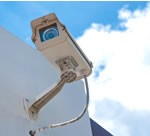
Ken might look like one of the crash-test dummies, but he doesn’t get banged around. Rather, he is a sort of film star, used to evaluate the best sites around Virginia Tech to place new digital security cameras.
Ken and his handlers from Northern Virginia-based X7 Systems Integration are working under a nearly $1 million contract to install a networked video security system around campus.
Ken’s job is to stand very still while cameras film him, so technicians can assess the quality of images at various locations.
Since the April 16, 2007, campus shootings, the university has become a testing ground and even model for campus safety, including an extensive threat assessment program.
The project could result in up to 2,500 security cameras being installed around the 2,600-acre campus over the next several years, and add one more layer to Tech’s security efforts.
“You never stop trying to make the campus safer,” university spokesman Mark Owczarski said.
The contract with X7 Systems, dated April 2011, allows for three phases of the project, including the already completed $221,098 installation of cameras in the Perry Street parking garage that opened last year. Phase two of the project will upgrade the approximately 250 cameras scattered across campus.
That work is expected to be completed by December and cost $708,736, Owczarski said.
The initial three-year agreement can be renewed for up to five additional years, and could include a third phase of installations of up to 2,500 cameras, contract documents show.
“The university has not defined what it seeks in a phase three,” Owczarski said. So no dollar amount has been assigned for that phase.
For a decade or more, there have been security cameras on campus, but the technologies and the oversight have been decentralized. They range from cameras on automated teller machines installed and monitored by banks to a camera trained on a piece of the moon kept in the dean of engineering’s suite.
While cameras already are part of campus life, “what hasn’t been in place is a policy and a directive to manage them more effectively,” Owczarski said.
Police have talked about a centralized security camera system for years, Owczarski said. Now with the X7 contract, that process is under way.
The centralized system includes a strict acceptable-use policy for the cameras and those who monitor them, and it outlines ethical and legal guidelines, as well as regulations for archiving and using footage.
The policy also establishes a five-member Surveillance Oversight Committee, including representatives from Tech police, student affairs, facilities, emergency management, and university relations to review all requests for cameras.
The police department, in cooperation with the information technology division, ensures that best practices are followed for all cameras installed, according to the policy.
Private industry has used surveillance systems for a long time, said Tech police Maj. Kevin Foust, assistant director for campus security.
Almost any store—from the grocery to the local Dick’s retailer—uses video surveillance to prevent and prosecute crimes and protect shoppers. Now universities are installing them, too.
Eventually, the goal is to “get as much coverage on campus as possible in the public areas,” Foust said.
X7 Systems not only will install the cameras and networking equipment but also is helping university officials analyze the best places to put them. Some of those areas will include the Drillfield, parking lots, and other public areas.
Law and policy restrict the areas where the cameras can be used, and with tighter controls and a centralized system, privacy will be better protected, Foust said.
The cameras may be placed only in areas where the public has no reasonable expectation of privacy, including parking garages and lots, sidewalks, and other public areas.
There are many places where cameras may not be placed, including the hallways inside dormitories, which are considered residences, Foust said.
Decisions on where to put the cameras will be made in consultation with the university’s legal team, Foust said.
The cameras are expected to help police by providing evidence in case of crimes, as well as basic security.
Foust said such as system would have been useful on Aug. 4, when middle school visitors to campus reported seeing a man with a gun near Dietrick Dining Hall. No one carrying a gun was found, although police searched for hours.
Foust said having high-quality security camera footage allows police to enlist the help of the public in combating security threats.
Copyright (c) 2012, The Roanoke Times (Roanoke, Va.). Visit The Roanoke Times online at www.roanoke.com. Distributed by MCT Information Services.
- Extron AV Switching, Streaming, and Control Systems Aid Higher Learning at Idaho’s First Medical School - June 1, 2021
- Extron XTP, Streaming, and Control Systems Empower Point Park University’s Varsity Esports Program - June 1, 2021
- Extron NAV Series Delivers AVoIP Throughout Allied Health Veterans Hall at UNC Wilmington - June 1, 2021
